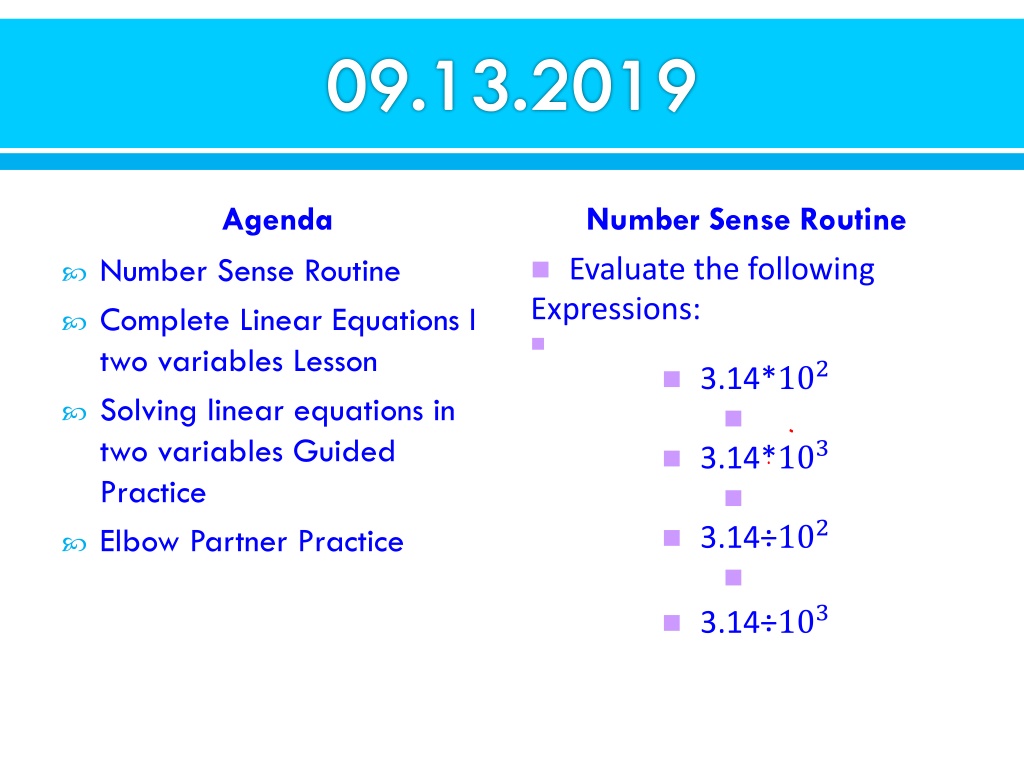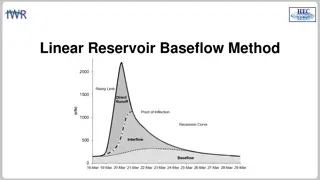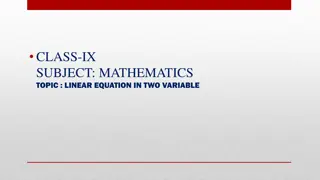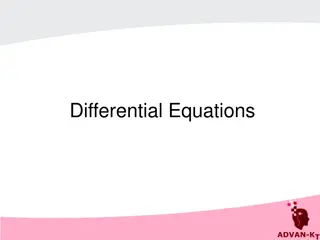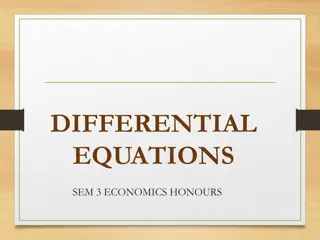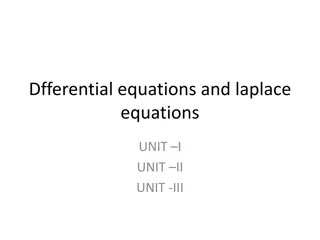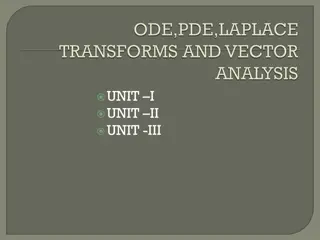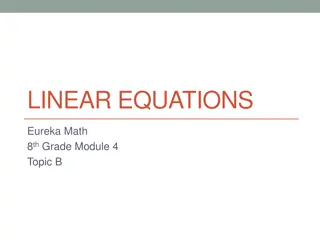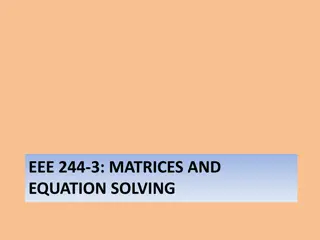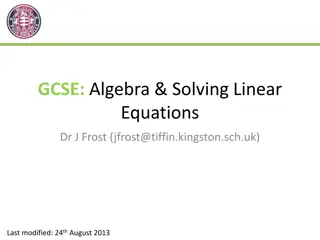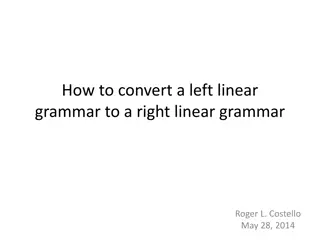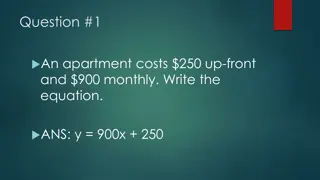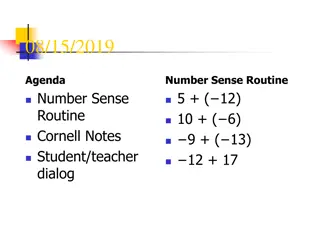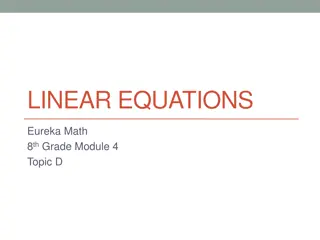Understanding Linear Equations in Two Variables
Explore linear equations in two variables, solving systems of equations, graphing solutions, and determining types of solutions. Learn how to analyze and find solutions graphically, identify infinite solutions, no solutions, and unique solutions, and understand the concept of dependent systems. Discover the different types of linear systems and how to evaluate expressions and solve equations with guided practice examples.
Download Presentation

Please find below an Image/Link to download the presentation.
The content on the website is provided AS IS for your information and personal use only. It may not be sold, licensed, or shared on other websites without obtaining consent from the author. Download presentation by click this link. If you encounter any issues during the download, it is possible that the publisher has removed the file from their server.
E N D
Presentation Transcript
09.13.2019 Agenda Number Sense Routine Number Sense Routine Complete Linear Equations I two variables Lesson Solving linear equations in two variables Guided Practice Elbow Partner Practice Evaluate the following Expressions: 3.14*102 3.14*103 3.14 102 3.14 103
5. 2x - 3y = -24 solve for y 6. x + 6y = 18 solve for x
Warm up: Solve the given system by elimination ( ) 1) 6x 3y = 21 2, 3 3x + 3y = - 3 2) -3x + 4y = -4 ( ) 0, 1 6x 12y = 12
Solve Systems of Equations by Graphing
Linear Systems Question: How can we analyze a system of Equations Graphically to determine if there is a solution? A system of equations means: There are two or more equations sharing the same variables Solution: Is a set of values that satisfy both equations. Graphically it is the point of intersection
Types of Systems There are 3 different types of systems of linear equations 3 Different Systems: 1) Infinite Solutions 2) No Solution 3) One solution
Determine a Solution to a Linear System OPENER Which of the following ordered pairs are solutions to the following system? 5x +2y = 10 -4x + y = -8 (3,1) 5(3) + 2(1) = 10 17= 10 NO 5(2) + 2(0) =10 -4(2) + 0 = -8 2) (2,0) 1) ? YES
Type 1: Infinite Solutions A system of linear equations having an infinite number of solutions is described as being consistent-dependent. y The system has infinite solutions, the lines are identical x
y = 2x + 3 1. Graph to find the solution. y = 2x + 3 y = 2x + 3 INFINITE Solutions
Type 2: No Solutions A system of linear equations having no solutions is described as being inconsistent. y The system has no solution, the lines are parallel x Remember, parallel lines have the same slope
2. Graph to find the solution. y y 2 2 x x 5 1 = = + + No Solution
Type 3: One solution A system of linear equations having exactly one solution is described as being one solution. y The system has exactly one solution at the point of intersection x
3. Graph to find the solution. y = 3x 12 y = -2x + 3 Solution: (3, -3)
Steps 1. Make sure each equation is in slope-intercept form: y = mx + b. 2. Graph each equation on the same graph paper. 3. The point where the lines intersect is the solution. If they don t intersect then there s no solution. 4. Check your solution algebraically.
1. Graph to find the solution. 2 2 x x 2 2 y y 8 + = = 4 Solution: (-1, 3)
3. Graph to find the solution. x y 2 = + = 2 x 3 y 9 Solution: (-3, 1)
4. Graph to find the solution. y 5 = 2 x y 1 + = Solution: (-2, 5)
Types of Systems There are 3 different types of systems of linear equations 3 Different Systems: 1) Infinite Solutions 2) No Solution 3) One solution
So basically. If the lines have the same y-intercept b, and the same slope m, then the system has Infinite Solutions. If the lines have the same slope m, but different y- intercepts b, the system has No Solution. If the lines have different slopes m, the system has One Solution.
4. Graph to find the solution. y 5 = 2 x y 1 + = Solution: (-2, 5)
Opener Finish Graphing to Perfection Quiz 10 minutes
Solve Systems of Equations by Substitution
Steps 1. One equation will have either x or y by itself, or can be solved for x or y easily. 2. Substitute the expression from Step 1 into the other equation and solve for the other variable. 3. Substitute the value from Step 2 into the equation from Step 1 and solve. 4. Your solution is the ordered pair formed by x & y. 5. Check the solution in each of the original equations.
Solve by Substitution 1. x = 4 3x + 2y = 20 1. ( 4, 16)
Solve by Substitution 2. y = x x + y = 3 2. (2, 1)
Solve by Substitution 3. 3x + 2y = 12 y = x 1 3. ( 2, 3)
Solve by Substitution 4. x = 1/2 y 4x y = 10 4. (8, 22)
Solve by Substitution 5. x = 5y + 4 3x + 15y = 5. No solution
Solve by Substitution 6. 2x 5y = 29 x = 4y + 8 6. (12,
Solve by Substitution 7. x = 5y + 10 2x 10y = 20 7. Many solutions
Solve by Substitution 8. 2x 3y = 24 x + 6y = 18 9. (-6, 4)
CW/HW 1. y 6 x 11 = 2. 2 x = 3 y 1 = = 2 x 3 y 7 y x 1 3. y x 3 y x = 5 3 4. 3 y x = 3 5 y x 3 17 = + = 5 4 5. y x 2 y 18 6. y 3 5 x 2 7 = = = x y 4 3 12 =
Ticket out the door Make y the subject: M+Y=X
Reference teachers.henrico.k12.va.us math HCPSAlgebra1 Documents SolveS...
